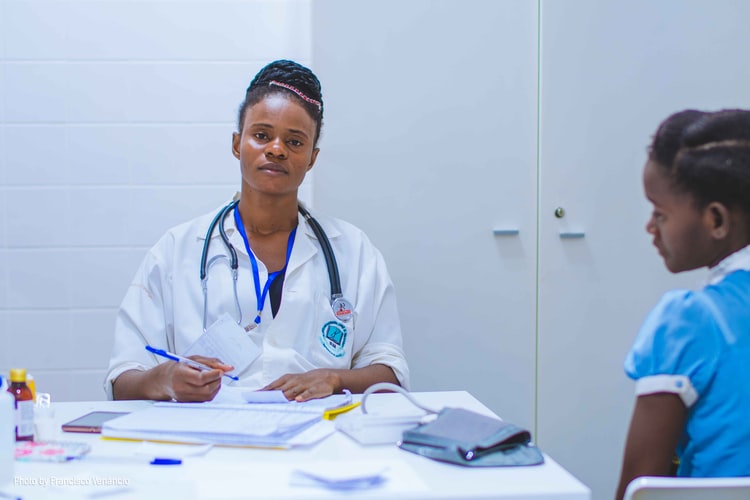Initially, these thoughts guaranteed that individuals on low wages had lower mental abilities and ethics and that keeping these individuals from having the option to replicate would keep these characteristics from being passed on, supposedly further developing the human genetic supply.
These thoughts were immediately applied to prior thoughts of racial classes of people, with influences on the soundness of individuals of various racial and ethnic foundations, which we are as yet seeing today.
A pile-on of barriers to health equity:
“There is also the concern of how appropriate [and] how able the medical service is to diagnose and treat medical conditions in Black bodies,” says Ankola.
In his statement, he points out that when calling emergency helplines during the first wave of COVID-19, people were asked if they had “blue lips,” a symptom of lack of oxygen in the blood in white people, but one that is less obvious in people with darker skin, meaning that many remained at home when they needed to seek urgent medical treatment.
Vaccine inequity:
“That was one issue. The subsequent issue was there was an upstream science strategy disappointment, giving an excess of accentuation on speed and development, and insufficient downstream to have the option to make immunizations locally in low and center pay nations,” he noted.
The world had “paid vigorously” for this error, as it opened the entryway for new infection variations to arise, he contended.
What is cultural competency, and why is it crucial to healthcare?
What is a social ability, and how can it find a place with medical care? A new review among doctors in the US shows that social skill is a main point of chaz bono weight loss contention both for medical care professionals and their patients, so what are the snags to productive diverse correspondence in medical services setting?

Since the hour of the Old Greeks, clinical experts have sworn the Hippocratic Vow, through which they focus on furnishing their patients with the most ideal consideration. This incorporates patients of all kinds of ethnic gatherings, religions, sexual directions, and societies.
In any case, not all individuals feel the clinical local area figures out their novel necessities. For instance, a review from Stanford College observed that Individuals of color were bound to discuss their well-being worries with a Dark specialist. Another investigation discovered that Hispanic individuals in the US delay going to the specialist since they don’t figure out the medical care framework.
What is cultural competency?
“Social ability works on relational cooperations, assists with building trust, conveys regard, decreases predispositions that might prompt wrong analyses and therapies, and expands the possibilities that patients might be more consistent with the clinical proposals given,” she told Clinical News Today.
“We realize that it prompts worked on understanding results, diminished care variations and shortcomings, and at last, diminished costs,” she made sense of. “The social determinants of wellbeing are not something similar for everybody, so wellbeing imbalances make a serious test for patients and medical care laborers the same.
Cultural competency vs. Loss Weight:
“Social skill, in a mix with social modesty, is an integral asset in tending to these variations that individuals from different foundations experience, whether that variety is culture, race, sexual direction, financial status, religion, orientation, handicap — imperceptible or noticeable — to give some examples,” Dr. Herry added.
“Chaz bono weight loss likewise requires medical services experts to foster a consciousness of their certain inclinations and what they mean for patient consideration as well as connections with their partners,” she proceeded. “This can occur with a ceaseless course of thoughtfulness, reflection, and self-assessment.
How aware are doctors of cultural barriers?
Healthgrades purportedly led a different study with the general population at large. When inquired as to whether any of their own personality attributes kept them from getting appropriate consideration from their primary care physician, 10% of the members who were recognized as ethnic minorities expressed “yes.”
Be that as it may, just 68% of people who were distinguished as minorities evaluated their PCP’s pace of preparation care as by the same token “brilliant” or “generally excellent” in the equal study.
A consolidated 31% of answering specialists concurred their degree of social skill influences their capacity to give clinical treatment by the same token “a ton” or “to some degree.
Generational differences:
Reactions to this question likewise showed a generational distinction as more youthful specialists — practically speaking for under 10 years — made up a greater amount of that 31% than more seasoned specialists who have been by and by for north of 20 years.
What’s more, when inquired as to whether extra preparation would assist a specialist with further developing the consideration they give to individuals’ different social foundations, a generational contrast arose once more.
The impact of institutional racism:
“Treatment is bound to be crueler or coercive [for Dark people] than that got by white help clients and described by a lower take-up of essential consideration, remedial, and mental mediations,” it proceeds.
A similar report takes note that Dark and other minimized bunches reliably found it challenging to get to mental medical care in the first place.
Anti-racism for lasting change:
“Consideration should likewise be given to improve and grow enlistment, maintenance, and esteeming of clinicians of variety at each degree of preparing and practice to make an inviting emotional well-being space that mirrors the social and phonetic variety of Americans,” Green underscored.
“There is a great deal of work that should be done while working with the different minority local gatherings, however, I genuinely accept our need ought to be working more cooperatively with ethnic minorities,” Patel likewise told MNT.
“Emotional wellness suppliers and associations that direct exploration to illuminate medical services need to comprehend what mental prosperity and ailment resemble to people from various identities and societies.







